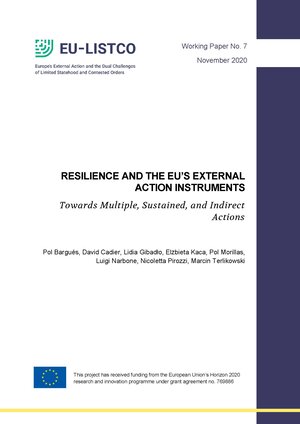
The EU is increasingly concerned with the diffusion and uncertainty of risks and threats in the neighbourhood, and resilience appears as a useful and pragmatic policy framework to address risks in areas of limited statehood and contested orders. The working paper draws from extensive report analysis and semi-structured interviews with EU officials to examine the diplomatic, economic, and military instruments that the EU mobilizes in a resilience-informed external action. The main contribution is that these instruments are increasingly facilitating resilience through multiple, long-term, and indirect actions. First, instruments have expanded and diversified to undertake as many different actions as possible. Second, they are sustained over long periods of time, even when there are no risks or threats or after peace and stability have been reached. Third, since resilience emerges “from below”, building on societies’ own resources and tools, EU instruments facilitate resilience indirectly, through constant engagement in the neighbourhood.